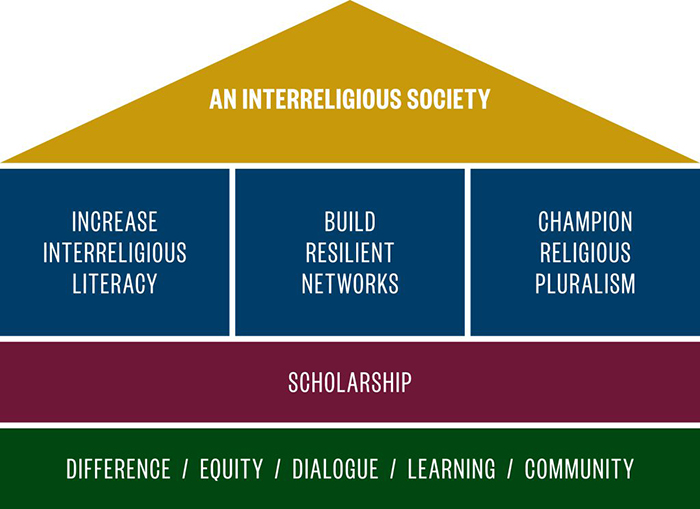ICJS Strategic Framework
Building an Interreligious Society
In March 2021, the ICJS Board of Trustees approved a Strategic Framework with a new vision, mission, and goals for ICJS. The framework is depicted here as a house with the following components:
Foundation
ICJS’ five core values serve as the foundation for all of our work.
Ground Floor
Scholarship—including research, writing, teaching, and convening of leading voices—anchors all ICJS programs and advances the emerging field of Interreligious & Interfaith Studies.
Pillars
The three primary goals of our Strategic Framework hold up our vision of an Interreligious Society.
Roof
ICJS envisions an interreligious society where dialogue replaces division, friendship overcomes fear, and education eradicates ignorance.

Goal 1. Increase interreligious literacy
Equip our learning communities
- Expand educational programs that promote understanding of one’s own religious tradition and sacred texts, other religious traditions and sacred texts, and the history and practices of religious bigotry (e.g., Islamophobia and Antisemitism) that continue to permeate religious communities and society
- Effectively reach into community sectors (e.g., education, nonprofit, congregations) using the Fellowship model
- Create and promote the ICJS Speakers Bureau
- Use multiplatform publishing and promotion to expand the reach of ICJS content and writing
Goal 2. Build resilient interreligious networks
Facilitate strong relationships
- Develop networks within community sectors (e.g., education, nonprofit, congregational) for ongoing interreligious partnerships and relationships
- Cultivate strategic partnerships with secular, religious, and interreligious institutions
- Train a diverse pipeline of interreligious leaders
Goal 3. Advance the academic field of Interreligious & Interfaith Studies
Be a leader in academic discourse
- Establish the Silber-Obrecht Endowed Lectureship as the premier lecture in the field of Interreligious and Interfaith Studies
- Equip faculty from diverse institutions (e.g., colleges, universities, seminaries) to develop interreligious literacy in their courses and seminars
- Convene conferences and forums that advance the field of Interreligious and Interfaith Studies
- Support and promote the interreligious research, writing, and expertise of ICJS staff
- Provide service to the field of Interreligious and Interfaith Studies (e.g. chair committees, participate on panels, contribute to journals, support and lead professional societies)
Goal 4. Inspire the public to champion religious pluralism
Be a thought leader
- Provide insight on interreligious issues through commentaries in local and national press
- Repurpose ICJS scholarly work for use in news and commentary outlets
- Create and promote an active ICJS Speakers Bureau
Goal 5. Foster a culture of equity & inclusion for our interreligious work
Build trust, support & involvement
- Recognizing where ICJS has an opportunity for growth and improvement, build and develop ICJS relationships with Muslims, people of color, and women
- Encourage diverse voices at ICJS (as program presenters, program participants, trustees, staff, and vendors)
- Ensure diverse voices and perspectives are represented in ICJS resources and materials
- Prioritize recruitment of Fellowship cohorts that reflect the broader community within which we live